Adrian Tchaikovsky's Blog, page 4
October 10, 2017
Reading Recs and the New Epics
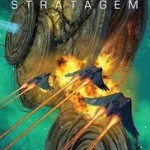 A long-overdue bit of bloggery for one reason or another, but time to run down on some more good stuff I’ve read, starting with Sequels Corner. Recommending sequels is always a bit of an oddity. Did you like [Book 1]? In which case you’ll probably like this one approximately more or less as much. However, there have been a couple definitely strong enough to warrant a word. Firstly, Yoon Ha Lee’s Raven Stratagem is a cracking follow-up to the world-class Ninefox Gambit. There’s a great deal to love here, not only a widening of Lee’s fascinating universe but also a particularly cunning game the author plays with their readership (which I can’t really go into because of spoilers). There’s also the simple fact that this book ends the midpoint of a series where most series would just cut to credits, making me wonder what new reaches the next novel is going to explore.
A long-overdue bit of bloggery for one reason or another, but time to run down on some more good stuff I’ve read, starting with Sequels Corner. Recommending sequels is always a bit of an oddity. Did you like [Book 1]? In which case you’ll probably like this one approximately more or less as much. However, there have been a couple definitely strong enough to warrant a word. Firstly, Yoon Ha Lee’s Raven Stratagem is a cracking follow-up to the world-class Ninefox Gambit. There’s a great deal to love here, not only a widening of Lee’s fascinating universe but also a particularly cunning game the author plays with their readership (which I can’t really go into because of spoilers). There’s also the simple fact that this book ends the midpoint of a series where most series would just cut to credits, making me wonder what new reaches the next novel is going to explore. 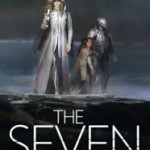 This is, as it happens, also true of the other series I have on my list here, as I finished off Peter Newman’s The Seven, book three of the excellent series that began with the acclaimed The Vagrant. Book 2, The Malice, could well have been a very satisfactory end to a more traditional good versus evil narrative, but Newman has a lot more to say about consequences in the third book, as well as finishing off the strange story of how this world came to be. Now complete (for those who don’t touch these things until they are), the whole is one of the most innovative and interesting fantasy series of recent years.
This is, as it happens, also true of the other series I have on my list here, as I finished off Peter Newman’s The Seven, book three of the excellent series that began with the acclaimed The Vagrant. Book 2, The Malice, could well have been a very satisfactory end to a more traditional good versus evil narrative, but Newman has a lot more to say about consequences in the third book, as well as finishing off the strange story of how this world came to be. Now complete (for those who don’t touch these things until they are), the whole is one of the most innovative and interesting fantasy series of recent years.
 I’m going towards a larger topic, but I have a couple of other mentions to get through, first of all Nate Crowley’s The Death and Life of Schneider Wrack, collecting the linked novellas The Sea Hates a Coward and Grand Amazon. This also stands as a masterpiece of the weird: Schneider Wrack wakes up dead, a zombie toiling on an extraterrestrial whaling ship. He was once a mild-mannered librarian, or alternatively a dangerous political dissident – his memories so scattered he doesn’t even know what he did to deserve the fate. The world of the whaler Tavuto, the endless ocean where it plies its trade, the exploitation of the dead and the even more bizarre places (geographically and personally) Wrack’s journey takes him are a whirl of grotesque, often bleakly funny originality.
I’m going towards a larger topic, but I have a couple of other mentions to get through, first of all Nate Crowley’s The Death and Life of Schneider Wrack, collecting the linked novellas The Sea Hates a Coward and Grand Amazon. This also stands as a masterpiece of the weird: Schneider Wrack wakes up dead, a zombie toiling on an extraterrestrial whaling ship. He was once a mild-mannered librarian, or alternatively a dangerous political dissident – his memories so scattered he doesn’t even know what he did to deserve the fate. The world of the whaler Tavuto, the endless ocean where it plies its trade, the exploitation of the dead and the even more bizarre places (geographically and personally) Wrack’s journey takes him are a whirl of grotesque, often bleakly funny originality.
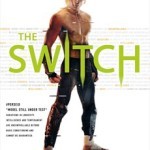 I also had the pleasure of reading Justina Robson’s The Switch, which seems to have snuck into print without my being any the wiser, and, I’m going to be frank, is lumbered with a cover that doesn’t do it many favours. Which is a shame, because this is a top notch book. I’m a big fan of Robson’s at any time. Glorious Angels, her previous book, was mind-blowing post-fall SF with all manner of other elements woven into the mix. The Switch is a far future cyberpunk (term used advisedly) chase through a world ruled by a corrupt and crazy (and seriously homophobic) theocracy. The ‘hero’ is an elegant thug, a prize-fighter, who ends up with a very contraband piece of hardware in his head, linking him to something vastly grander and more destructive than he can encompass. Plus there’s the possibility that the theocracy, with its claims of being able to breed the miraculous, might not be that crazy after all, interference by offworld agencies that don’t give a damn about the Prime Directive, and a genuinely fulfilling character arc for the lead. Robson is always worth picking up, and never disappoints.
I also had the pleasure of reading Justina Robson’s The Switch, which seems to have snuck into print without my being any the wiser, and, I’m going to be frank, is lumbered with a cover that doesn’t do it many favours. Which is a shame, because this is a top notch book. I’m a big fan of Robson’s at any time. Glorious Angels, her previous book, was mind-blowing post-fall SF with all manner of other elements woven into the mix. The Switch is a far future cyberpunk (term used advisedly) chase through a world ruled by a corrupt and crazy (and seriously homophobic) theocracy. The ‘hero’ is an elegant thug, a prize-fighter, who ends up with a very contraband piece of hardware in his head, linking him to something vastly grander and more destructive than he can encompass. Plus there’s the possibility that the theocracy, with its claims of being able to breed the miraculous, might not be that crazy after all, interference by offworld agencies that don’t give a damn about the Prime Directive, and a genuinely fulfilling character arc for the lead. Robson is always worth picking up, and never disappoints.
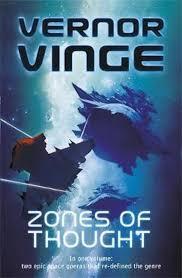 As a late addition to my list, I have finally read Vernor Vinge’s Zones of Thought duo, collecting A Fire Upon the Deep and A Deepness in the Sky, because these (the latter especially) are the books everyone compared Children of Time to from the moment it was released. And yes, Deepness does have an emergent civilisation of spider-like aliens, so perhaps the comparison was inevitably quick to come. However, giving critics their due (and not wanting to overpraise my own work) I feel a definite kinship inthe way Vinge approaches writing the alien. In Fire there is a wonderful society of dog-like creatures where packs are mentally linked, so that a group of four or five is an individual. There is a wider plot involving humans crashing on the planet and some truly interstellar scale stuff going on, but it is the Trines and their world I loved most. Vinge thinks through the consequences of his set-up through to all sorts of strangeness, all beautifully logical in its presentation. In Deepness, we have a civilisation of spiders living on a planet where the sun just… goes out for 200 years of every 300. They have evolved, genetically and socially, to work to this rhythm of activity and hibernation, but now they’re hitting around a 20th century level of tech, and some of them are suggesting that they don’t have to be slaves to the sun. At the same time, their progress is watched by a particularly conflicted and toxic human colony orbiting their planet, just waiting for them to become advanced enough to be useful… And another thing Vinge does so very well is presenting novel forms of evil. The Emergents from Deepness and Flenser/Steel from Fire are utterly, horrifyingly loathsome, whilst also being entirely logical consequences of their culture and history. In short: if you did like Children of Time then these books are for you. They are pure SF gold.
As a late addition to my list, I have finally read Vernor Vinge’s Zones of Thought duo, collecting A Fire Upon the Deep and A Deepness in the Sky, because these (the latter especially) are the books everyone compared Children of Time to from the moment it was released. And yes, Deepness does have an emergent civilisation of spider-like aliens, so perhaps the comparison was inevitably quick to come. However, giving critics their due (and not wanting to overpraise my own work) I feel a definite kinship inthe way Vinge approaches writing the alien. In Fire there is a wonderful society of dog-like creatures where packs are mentally linked, so that a group of four or five is an individual. There is a wider plot involving humans crashing on the planet and some truly interstellar scale stuff going on, but it is the Trines and their world I loved most. Vinge thinks through the consequences of his set-up through to all sorts of strangeness, all beautifully logical in its presentation. In Deepness, we have a civilisation of spiders living on a planet where the sun just… goes out for 200 years of every 300. They have evolved, genetically and socially, to work to this rhythm of activity and hibernation, but now they’re hitting around a 20th century level of tech, and some of them are suggesting that they don’t have to be slaves to the sun. At the same time, their progress is watched by a particularly conflicted and toxic human colony orbiting their planet, just waiting for them to become advanced enough to be useful… And another thing Vinge does so very well is presenting novel forms of evil. The Emergents from Deepness and Flenser/Steel from Fire are utterly, horrifyingly loathsome, whilst also being entirely logical consequences of their culture and history. In short: if you did like Children of Time then these books are for you. They are pure SF gold.
Now, last time at the helm I had read Age of Assassins, Kings of the Wyld and Court of Broken Knives, and you can see my thoughts on those here. These three form part of a set of fantasy novels that all seem to have come out within a few months of each other (or at least which I became aware of around the same time), and so in my mind form a next generation of sorts within the UK fantasy genre. Things seldom line up quite like this, but there was definitely a group of writers I felt I came up through the ranks with, and there have been a few others in the interim.
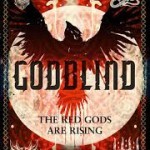 The two I hadn’t got round to at that point were Blackwing by Ed McDonald and Godblind by Anna Stephens. Last to First, Godblind is very much what I’d think of as an epic fantasy in the traditional vein – the sort of book that John Gwynne writes so well, for example. There is politics and there is war, and a big cast of characters giving input on all sides. In Godblind the bad guys are bad (they’re the followers of the goddess of pain so there’s very little moral wiggle room for them to be honest) and the good guys are generally good. It’s a story of a grand scale, and very much Part One of a long series. The world is interesting – the magic walks a fine balance where it is definitely present and powerful, but at the same time accessible only to a few or under extreme circumstances. The gods of the title are definitely more than just carven idols and empty worship, though, and benevolent and malign deities are actively weighing on the scales – not something you see in fantasy as much as you’d think. I did have some problems with the book as a reader, primarily that there are a lot of POV characters and individual sections are extremely short, sometimes just 3 pages or so, which rather than pace can give an impression of wheels spinning while the plot goes nowhere. (Empire in Black and Gold in its original form had exactly the same issue, but sections got stitched together in edits.)
The two I hadn’t got round to at that point were Blackwing by Ed McDonald and Godblind by Anna Stephens. Last to First, Godblind is very much what I’d think of as an epic fantasy in the traditional vein – the sort of book that John Gwynne writes so well, for example. There is politics and there is war, and a big cast of characters giving input on all sides. In Godblind the bad guys are bad (they’re the followers of the goddess of pain so there’s very little moral wiggle room for them to be honest) and the good guys are generally good. It’s a story of a grand scale, and very much Part One of a long series. The world is interesting – the magic walks a fine balance where it is definitely present and powerful, but at the same time accessible only to a few or under extreme circumstances. The gods of the title are definitely more than just carven idols and empty worship, though, and benevolent and malign deities are actively weighing on the scales – not something you see in fantasy as much as you’d think. I did have some problems with the book as a reader, primarily that there are a lot of POV characters and individual sections are extremely short, sometimes just 3 pages or so, which rather than pace can give an impression of wheels spinning while the plot goes nowhere. (Empire in Black and Gold in its original form had exactly the same issue, but sections got stitched together in edits.)
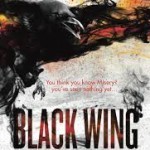 Blackwing is a very interesting prospect. Is it Grimdark? I was on a panel with Ed at Fantasycon where he coined the term “Grimheart” as a joke, but there’s a genuine point there. It is a very grim world, overshadowed by a magical war of unthinkable powers who use humans (or enslaved former humans) as their pawns. The last major kick-off led to a large portion of the world becoming a chaotic nightmare of monsters, broken land and poisonous weather, and things have only gone downhill from there. At the same time the main character Galharrow is not your pitiless Bad-Man-In-A-Bad-World, but instead is basically Rick from Casablanca, the world-weary bitter man who can still be called back to do the right thing. McDonald has a compelling style, and he gives Galharrow a strong, likeable voice. More, the world has that fine balance where it gives a fantasy reader what they want whilst also reserving a fair amount of the new. I was definitely put in mind of Newman’s The Vagrant which pulled off the same trick so well.
Blackwing is a very interesting prospect. Is it Grimdark? I was on a panel with Ed at Fantasycon where he coined the term “Grimheart” as a joke, but there’s a genuine point there. It is a very grim world, overshadowed by a magical war of unthinkable powers who use humans (or enslaved former humans) as their pawns. The last major kick-off led to a large portion of the world becoming a chaotic nightmare of monsters, broken land and poisonous weather, and things have only gone downhill from there. At the same time the main character Galharrow is not your pitiless Bad-Man-In-A-Bad-World, but instead is basically Rick from Casablanca, the world-weary bitter man who can still be called back to do the right thing. McDonald has a compelling style, and he gives Galharrow a strong, likeable voice. More, the world has that fine balance where it gives a fantasy reader what they want whilst also reserving a fair amount of the new. I was definitely put in mind of Newman’s The Vagrant which pulled off the same trick so well.
So: looking at those five books, Assassins, Broken Knives, Blackwing, Wyld and Godblind, what was the thinking 18m to 2 years ago amongst commissioning editors? Mostly, no idea. There’s an interesting spread that suggests fantasy is going back towards the more magical – Age of Assassins is arguably the least magic and its hero is an actual magician. I also get a sense that these books are building on strong past foundations. Drawing inferences as to individual writers’ inspirations is always a dodgy game, but I’ve picked up a definite sense of Hobb, Gemmell and Polansky in the mix. At the same time there is a lot of the new here, whether it’s Broken Knives’ ambitious, elegant prose, the sly social commentary of Assassins’ ‘Blessed’ and ‘Grateful’ for its nobles and commoners, or the fact that most of these books create diverse worlds treating openly on topics that epic fantasy has traditionally been slow about – openly homosexual characters, for example. Plus there’s a nice scatter between the more-grimdark of Knives and Blackwing through the “serious epic” of Godblind and on to the more personal story of Assassins and the semi-comedy of Kings of the Wyld that makes all five very pleasant a read together, as they don’t step on each other’s toes much at all. I suspect there will be a fiercer than usual fight over the Morningstar Award in the Gemmells next year.
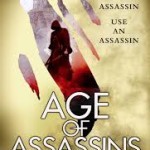
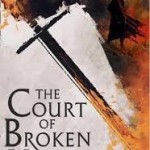
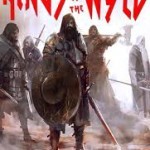
October 2, 2017
Hold(stock) the Press!
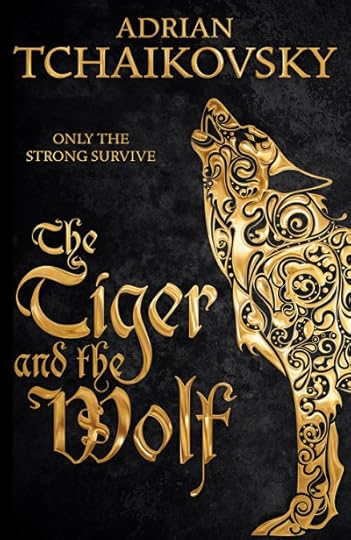 So: not the planned reading recs post, which has been shoved into the future like a dyspeptic time traveller. Instead, lord alive, The Tiger and the Wolf won the Robert Holdstock Award for best fantasy novel at the British Fantasy Awards, which somewhat blindsided me (as anyone listening to my cobbled-together speech probably gathered).
So: not the planned reading recs post, which has been shoved into the future like a dyspeptic time traveller. Instead, lord alive, The Tiger and the Wolf won the Robert Holdstock Award for best fantasy novel at the British Fantasy Awards, which somewhat blindsided me (as anyone listening to my cobbled-together speech probably gathered).
Holdstock is one of the great fantasy writers, and the BFS award is one of the great accolades for fantasy, so I am utterly delighted. Also, that T&W, which I sweated and slaved over, and which I sunk a whole heap of worldbuilding into, has had that kind of recognition. I raise a glass to Maniye, Asamander and the rest of them.
Fantasycon, while I’m on the subject, was great. It’s perhaps the best con for catching up with friends, as there’s quite a close community feel to it these days. Allen Stroud and Karen Fishwick led a very able team to produce an enormously enjoyable convention. For those who aren’t in the con scene but are thinking about it, FCon is definitely a writer’s convention – most people are in the trade or are working on it, and a large proportion of the panels are on genre, genre tropes, writing technique and publishing. Plus fun stuff (I was on a mad panel game Dungeons and Disorderly run by Abaddon’s Dave Moore), book launches, the infamous karaoke and plenty of socialising. It’s one of the peregrinatory cons, and next year will be the turn of sunny Chester.
September 15, 2017
Thunkpiece: Bringing a Sword to a Gunfight
I caught the edge of a discussion (I think sparked from an Edge Lit panel, though I’m not 100% sure) about whether you can justify using swords in a setting that also has ready access to guns. Most of what I caught seemed to suggest that the consensus was “no”, but the mills of my mind have since churned up a fair few counter arguments (many of which may have been independently rehearsed in parts of the original discussion that I missed).
Firstly, however, why is this such a trope? It’s not as though, in the modern world, soldiers aren’t taught close combat techniques, or that people don’t get down to knives and the like, but swords have been no more than dress uniform accoutrements at best for a long time, close combat tends to mean unarmed, and I don’t even know if bayonet drill is something actively taught any more. The fact is that guns are a very effective way of killing people, and yet they lack a certain something in style. Fantasy and certain kinds of SF thrive on a particular sort of romance and nostalgia that guns don’t readily satisfy but swords definitely do. Despite “gun-fu” sequences in films like Equilibrium or The Matrix, there is an elan attached to swordsmanship that leads to a disproportionate showing for melee weapons (and here I’m meaning more than just “carries a knife as a back-up, but actually swords, pikes, axes and their SF equivalents, used as a significant part of a soldier’s offensive potential) in SF settings, or in fantasy settings where there are better ways of going about things (like late-period Shadows of the Apt, ahem ahem).
Let’s take that as a given, then: so you want to have your SF setting (or flintlock fantasy or whatever) with a side-order of swords, but you want to do more than just assume that your far-future space marines all carry sabres and are trained in their use for no earthly reason at all. What’s the rationale? Below are a few I’ve put together (and, in some cases, taken apart again) and doubtless there are more.
1. Guns are rubbish
This sounds like a bit of a cop out, but it’s probably the most solid for fantasy or pseudo-historical settings rather than SF (unless your advanced alien culture has some remarkable gaps in its tech tree), but there were centuries of real history where gunpowder troops went into battle alongside archers, crossbowmen, cavalry, pikes and all the rest. Early firearms made impressive noises but were slow and unreliable. If you’re writing flintlock fantasy or anything drawing from earlier history then you can mash up cannon, muskets, swords and what have you and feel property historically plausible. This also covers post-tech settings where guns are present, and may be very effective, but people can’t reliably maintain them or build new ones, hence you’ll never have enough guns to outfit your whole army.
2. En garde, sir
Perhaps there is a cultural fetish for duelling (as in Lee’s Ninefox Gambit setting for example). If it’s anything like the real world this is probably an elitist thing, and so not really a solution to the “soldiers with swords” problem, but if duelling is a big cultural thing then maybe your two opposing nobles wave off their soldiers and have at it with their flashingsabres to see who’s the biggest nob, so to speak. This is unlikely to result in entire battlefields of clashing broadswords while the space station charges up its death ray, but…
3. We don’t do it like that
It is also possible to have a cultural consensus that leaves military technology with one arm tied behind its back. If you have a setting where everyone works to a common societal norm, and that norm is basically designed to avoid full-on total war in favour of something more limited and genteel, then maybe people who could technologically afford guns, tanks and weapons of mass destruction do limit themselves to swords, perhaps because they’re sensible enough to prefer an absence of mass destruction (fancy!). This seems utterly daft but Italian Condottieri apparently just danced their armies around each other rather than getting stuck in and dying for their paycheques, which makes perfect sense when every army is a mercenary one. Also, I’ve seen it claimed that Aztecs and their neighbours went to war to capture prisoners for sacrifice as a primary objective, both for armies and for the glory of individual soldiers, which is a considerably more difficult thing than just killing someone, and which philosophy, played to the technological hilt, is unlikely to result in the machine gun nest. The downside of this sort of set-up is if someone comes in from the outside lacking the same cultural mores and is more committed to victory at any cost, which would upset such a system very quickly.
4. Don’t shoot that thing in here!
So what if your guns are too good? If you’re fighting somewhere vulnerable to explosive decompression, say, or where the atmosphere can go up like a torch, maybe conventional firearms aren’t your tool of choice and you could end up sending your space marines on boarding actions armed with axes and spears. I’ve not convinced myself, with this one – I suspect that if such a situation arose in the real world, the solution would be some alternative missile weapon like a spear-gun or high-power air rifle – something that didn’t have the same force or penetrative powers as a bullet, but which could still be used at range. However, the possibilities of speculative fiction are endless. If your kevlar equivalent is very good, for example, you may end up with a situation where your non-explosive gun-substitutes aren’t cutting it, and you end up having to scissor people out of their armoured suits the old fashioned way. Which is also the case with…
5. The guns, they do nothing!
So perhaps you and/or your opponents are bullet-proof, and yet somehow not sword-proof. This is another slightly dodgy proposal. Let’s say you’re like a D&D skeleton and piercing blows don’t worry you much, or the enemy is a zombie whose decapitation by axe is easier than a pinpoint shooting between the eyes with a pistol. However, the solution for a modern army would probably be something more like a rivebow from Mieville’s Perdido Street Station – a crossbow that throws a rotating saw blade – than a sword. However, one of the most famous SF settings of all time pulled this off – the shields in Dune allow slow strikes through but deflect swift ones. In the films they’re something of a noble’s toy (see duelling above) but you could have a similar device that was universal, negating the use of personal firearms.
6. Not as clumsy and random
Next up, how about your sword in itself permits some defence against firearms. Star Wars lightsabers deflect blaster bolts, allowing Jedi to take on legions of gun-wielding mooks. Of course the Jedi are special, and most Star Wars combat is still a ranged affair, plus SW blaster bolts are remarkably slow, enough to be plausibly deflected by a super-aware swordsman. Generalising this position into something where everyone carried a sword as standard would take a bit more stretching, but perhaps you mix it with the above and give people energy shields that can’t be shot through.
7. Swords of ultimate doom
In Warhammer 40K, melee weapons often hit incredibly hard – you’d rather be shot by a gun that fires actual explosive bolts that actually explode inside you than be slugged by a power fist, for example. This also covers lightsabres, which can shear through armour and robots and the arms of luckless aliens without slowing overmuch. Perhaps your melee weapons are just that good, worth all that training and lugging around, just so you can bring the house down should you be able to close with the enemy.
8. Up in your face
Fighting in twisty, turny caves, or in the close confines of a spaceship. Guns are all very well at range, but if your army (or just some specialists within it) will spent a lot of time in environments where you can’t see the enemy before you turn a corner and they’re nose to nose with you, perhaps you give them swords? Actually, most likely you give them knives, which don’t quite have the same panache, but the thought is there. It’s hard to think of a situation where range makes a sword the perfect weapon, though – if your enemy is six to eight feet away then you can shoot them very well with a pistol.
9. Transporter-fu
So what if you have all the open space you want, but you or the enemy, or both, can cover it very swiftly indeed. There is a weird mix of ancient and high-tech weapons in Wolfe’s New Sun books, but one thing they have is incredibly fast cavalry, far swifter than real horses. If your cavalry is fast enough that you won’t take more than a single round of shot on the way in, perhaps you do still have swords. Alternatively, if you’re fighting xenomorphs, genestealers or the bugs in Starship Troopers, which can come out of the ground/walls and jump you, or fly at you very fast (Shadows of the Apt-style) perhaps you eventually start training your soldiers to whack away with axes and broadswords because you can’t guarantee the enemy will stay at a civilised distance. For less monstrous armies, if your wizard or your starship’s transporter chief can just teleport squads right into the faces of the enemy, then melee weapons may well be the most useful thing you can carry (power sword in one hand and pistol in the other like a pirate in a boarding action) because you’ can’t rely on making use of the range of your rifles.
There must be scads of others – please comment below if any occur.
September 4, 2017
The Shape of Things to Come: Fantasycon and Upcoming Releases
At the end of this month I will indeed be at Fantasycon in Peterborough, doing the following hijinks:
Friday 7.30 Writing fighting panel
Friday 8.30 Dungeons and Disorderly (er… some kind of crowd-run D&D tomfoolery run by that rogue Dave Moore from Rebellion and I have no idea)
Saturday 12.30 Worldbuilding panel
Saturday 7.30 The New Epics panel
Saturday 10pm reading slot! Yes, this is a bit of a late one, but for anyone (1) at the con (2) still awake (3) able to wrest themselves from the bar/disco/gutter I will be reading a piece from Dogs of War, the SF novel coming out in November. It’s a good bit, I promise. I will be acting the part of an 800lb cyborg dog’s internal monologue. Expect lots of Churchill-style “Oh yuss”
In November, after a bit of a break, I am then Guest of Honour-ing at Novacon, my first time at that convention, in Nottingham.
Now, on with the music. Dogs of War is one of three upcoming releases to delight the eyes and the mind in the next few months, and as the various people responsible for blurbs have in general blurbed them better than I, I thought I would just let you have the skinny on them:
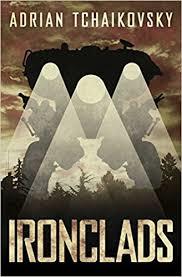 Ironclads (released November 2017)
Ironclads (released November 2017)
Scions have no limits. Scions do not die. And Scions do not disappear. Sergeant Ted Regan has a problem. A son of one of the great corporate families, a Scion, has gone missing at the front. He should have been protected by his Ironclad – the lethal battle suits that make the Scions masters of war – but something has gone catastrophically wrong. Now Regan and his men, ill equipped and demoralised, must go behind enemy lines, find the missing Scion, and uncover how his suit failed. Is there a new Ironclad-killer out there? And how are common soldiers lacking the protection afforded the rich supposed to survive the battlefield of tomorrow?
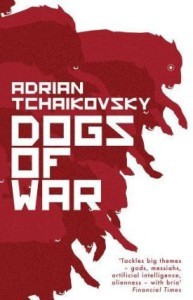 Dogs of War (released November 2017)
Dogs of War (released November 2017)
Rex is a Good Dog. He loves humans. He hates enemies. He’s utterly obedient to Master.
He’s also seven foot tall at the shoulder, bulletproof, bristling with heavy calibre weaponry and his voice resonates with subsonics especially designed to instil fear. With Dragon, Honey and Bees, he’s part of a Multi-form Assault Pack operating in the lawless anarchy of Campeche, Southeastern Mexico.
Rex is a genetically engineered bioform, a deadly weapon in a dirty war. He has the intelligence to carry out his orders and feedback implants to reward him when he does. All he wants to be is a Good Dog. And to do that he must do exactly what Master says and Master says he’s got to kill a lot of enemies. But who, exactly, are the enemies? What happens when Master is tried as a war criminal? What rights does the Geneva Convention grant weapons? Do Rex and his fellow bioforms even have a right to exist? And what happens when Rex slips his leash?
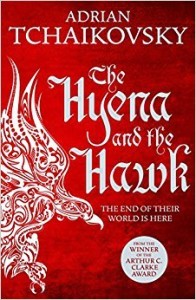 The Hyena and the Hawk (released February 2018)
The Hyena and the Hawk (released February 2018)
(This is book 3 of Echoes of the Fall, of course, so some minor spoilers below (such as “Ah, so X obviously doesn’t die in book 2”) for those who for some inconceivable reason aren’t slavishly up to date)
From the depths of the darkest myths, the soulless Plague People have returned. Their pale-walled camps obliterate villages, just as the terror they bring with them destroys minds. In their wake, nothing is left of the true people: not their places, not their ways. The Plague People will remake the world as though they had never been.
The heroes and leaders of the true people – Maniye, Loud Thunder, Hesprec and Asman – will each fight the Plague People in their own ways. They will seek allies, gather armies and lead the charge. But a thousand swords or ten thousand spears will not suffice to turn back this enemy. The end is at hand for everything the true people know.
*: not actually that.
July 28, 2017
Recommended Reading
First of all, out of a very strong field (see posts passim), Colson Whitehead took this year’s Arthur C Clarke award for his Underground Railway, which is a thought-provoking and powerful read. Definitely check it out, as well as the other fine books on the shortlist.
It’s been too long, Clarkes aside, since I wrote a post about good stuff I’ve read, meaning that plenty of good stuff has likely now slipped my memory (the phrase about good books being undeservedly forgotten is never truer than with me). I am also rather aware that I have a surfeit of good books waiting to be read, including Justina Robson’s Switch and Peter Newman’s The Seven, so hopefully I’ll do those soon enough. Peter’s in particular has been like a carrot on a stick in the near future, but as it’s also an enormous hardback and I’ve been on the move, it’s not had the attention it doubtless deserves. However, my list is not entirely Newmanless, so there’s something. Also not yet read is Ed McDonald’s Blackwing, though I hear good things of it and will be acquiring a copy in short order.
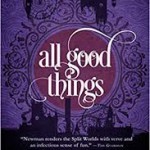 So, what have we got? First of all, All Good Things, which I finished on the train coming back from the Clarkes. This is Emma Newman’s conclusion to her Split Worlds series, which has been a favourite of mine from the start. I cannot really review this in detail because it is indeed the frankly apocalyptic conclusion to the series, and therefore every word would be a spoiler for the earlier volumes, but it is filled with twists and upped antes and some serious revelations about how the whole setting actually works. One of the best features of Newman’s world-building is that there really are very few reliables – there are a lot of big powers and factions, and labelling anyone with power as “good” is a risky business throughout. Also, given that “the status quo” is practically the villain, this isn’t another fantasy series that just aims to get back to where it started.
So, what have we got? First of all, All Good Things, which I finished on the train coming back from the Clarkes. This is Emma Newman’s conclusion to her Split Worlds series, which has been a favourite of mine from the start. I cannot really review this in detail because it is indeed the frankly apocalyptic conclusion to the series, and therefore every word would be a spoiler for the earlier volumes, but it is filled with twists and upped antes and some serious revelations about how the whole setting actually works. One of the best features of Newman’s world-building is that there really are very few reliables – there are a lot of big powers and factions, and labelling anyone with power as “good” is a risky business throughout. Also, given that “the status quo” is practically the villain, this isn’t another fantasy series that just aims to get back to where it started.
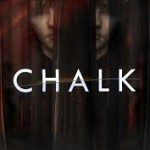 Another frequent visitor to these posts is Paul Cornell, but his most recent read is something of a different fish. It’s true that his Lychford novellas have a tint of the horrors to them, and he’s shown in the Shadow Police series that he has a deft hand at creating really visceral nastiness when he sets his mind to it. Chalk, however, is a full on proper old horror novel, and my caveat here is that horror isn’t my usual territory as a reader. Chalk is extremely good, though, and my usual squeamishness was not a factor. It’s psychological and supernatural threat rather than jump scares and buckets of blood. The setting is a private school and it goes into a lot of uncomfortable territory regarding bullying, Stockholm syndrome and the darkness of old folkways. The balance of what is and isn’t real, and how much supernature is generally there, is very carefully handled (I choose to believe “a bucketload” but the reader can interpret things either way, season to taste). It’s a compelling and disconcerting read.
Another frequent visitor to these posts is Paul Cornell, but his most recent read is something of a different fish. It’s true that his Lychford novellas have a tint of the horrors to them, and he’s shown in the Shadow Police series that he has a deft hand at creating really visceral nastiness when he sets his mind to it. Chalk, however, is a full on proper old horror novel, and my caveat here is that horror isn’t my usual territory as a reader. Chalk is extremely good, though, and my usual squeamishness was not a factor. It’s psychological and supernatural threat rather than jump scares and buckets of blood. The setting is a private school and it goes into a lot of uncomfortable territory regarding bullying, Stockholm syndrome and the darkness of old folkways. The balance of what is and isn’t real, and how much supernature is generally there, is very carefully handled (I choose to believe “a bucketload” but the reader can interpret things either way, season to taste). It’s a compelling and disconcerting read.
Paul and Emma are both regulars, and people whose books I will generally seek out both because I know them and I know I enjoy what they write. I have, however, been chasing down some newcomers to the fantasy scene, as there’s been quite a flowering of new talent in the heroic fantasy planter recently. Ed McDonald, as per the above, is one, but the books I have devoured so far include:
 Kings of the Wyld by Nicholas Eames is first. This is a book that left me a little conflicted, but on the other hand I enjoyed reading it so much that I’d be false to myself if I didn’t flag it up here. This is a good old heroic quest novel in a world where bands of monster-slaying mercenaries are treated like rock bands – touring around in lavishly outfitted wagons or airships, getting hordes of screaming groupies, all of that. The protagonists were, in times past, the rock gods of their day, but they got old and mostly retired, and now the lead man wants to get them together for one more gig, for the highest stakes. Eames writes semi-comedy fantasy very well (it’s the same kind of level as a lot of Spiderlight, if you liked that), his characters are likeable, his world is wild and very (intentionally) D&D-ish. It’s a great fun read. There is a subplot about the actual morality of killing non-humans which is left hanging, but I suspect the later books will return to it. There’s also a definite dearth of significant female characters who aren’t presented as motivation or eye-candy, which is something I’ve seen other reviews pick up on. The imbalance is in the book’s cast but not inherently in the world, which has considerable diversity in its supporting cast, and from what I hear the second book will focus primarily on the women of the next generation of mercenaries, and Eames’ writing overall is highly entertaining (also, Eames’ ideas on spinning the old dead bard joke are very similar to a direction I’ve taken in a project thankfully delivered before I read this).
Kings of the Wyld by Nicholas Eames is first. This is a book that left me a little conflicted, but on the other hand I enjoyed reading it so much that I’d be false to myself if I didn’t flag it up here. This is a good old heroic quest novel in a world where bands of monster-slaying mercenaries are treated like rock bands – touring around in lavishly outfitted wagons or airships, getting hordes of screaming groupies, all of that. The protagonists were, in times past, the rock gods of their day, but they got old and mostly retired, and now the lead man wants to get them together for one more gig, for the highest stakes. Eames writes semi-comedy fantasy very well (it’s the same kind of level as a lot of Spiderlight, if you liked that), his characters are likeable, his world is wild and very (intentionally) D&D-ish. It’s a great fun read. There is a subplot about the actual morality of killing non-humans which is left hanging, but I suspect the later books will return to it. There’s also a definite dearth of significant female characters who aren’t presented as motivation or eye-candy, which is something I’ve seen other reviews pick up on. The imbalance is in the book’s cast but not inherently in the world, which has considerable diversity in its supporting cast, and from what I hear the second book will focus primarily on the women of the next generation of mercenaries, and Eames’ writing overall is highly entertaining (also, Eames’ ideas on spinning the old dead bard joke are very similar to a direction I’ve taken in a project thankfully delivered before I read this).
 Then we have RJ Barker’s Age of Assassins. I was a little leery going into this one: it’s a castle intrigue story of treachery, nobles and assassins (obviously), and sits squarely in territory already well travelled in the genre (it might just be the simultaneous presence of fools and assassins but Robin Hobb loomed large in the mind), and normally that wouldn’t exercise me much. However, Barker gives everything a lively and engaging spin drawn entirely from his prose style and his characterisation. The story clips along and I ended up nearly missing train stops because I was so immersed in it. The hero is an apprentice assassin, lame and possessed of unusual skills, brought in by his master to infiltrate a castle’s squires and track down the source of an existing assassin problem. The double life is a nice touch, and you genuinely feel for him as he’s torn between the truth of his life, and his glimpse of something better (and/or worse because a lot of his peers in the castle are bastards). There are some interesting bits to the world, too, focusing on the way magic works (and backfires) which look as though they’re breadcrumbs for later development, but overall this is simply a good story, well told.
Then we have RJ Barker’s Age of Assassins. I was a little leery going into this one: it’s a castle intrigue story of treachery, nobles and assassins (obviously), and sits squarely in territory already well travelled in the genre (it might just be the simultaneous presence of fools and assassins but Robin Hobb loomed large in the mind), and normally that wouldn’t exercise me much. However, Barker gives everything a lively and engaging spin drawn entirely from his prose style and his characterisation. The story clips along and I ended up nearly missing train stops because I was so immersed in it. The hero is an apprentice assassin, lame and possessed of unusual skills, brought in by his master to infiltrate a castle’s squires and track down the source of an existing assassin problem. The double life is a nice touch, and you genuinely feel for him as he’s torn between the truth of his life, and his glimpse of something better (and/or worse because a lot of his peers in the castle are bastards). There are some interesting bits to the world, too, focusing on the way magic works (and backfires) which look as though they’re breadcrumbs for later development, but overall this is simply a good story, well told.
 The Court of Broken Knives by Anna Smith Spark is last on my list, and this is also a story of mercenaries and politicians and the terrible, terrible things that happen when they mix. Smith Sparkes is @queenofgrimdark on Twitter, and this is a very grim and dark book indeed. It’s a book of horrible people doing horrible things to each other, and that’s the sort of thing that can wear on the mind if not properly excecuted. There are writers who can pull off the trick to perfection, though – KJ Parker, say, or Abercrombie, or GRR Martin himself, and Smith Sparks is most certainly in that select company. She has a gift of making the reader like utter monsters for the moments they come under her narrative hand, only to realise the moment they step from the limelight just how appalling are the people we’ve been rooting for. Moreover, Smith Sparks is an exquisite stylist. Her prose has a rare poetic flair to it that gives every stab in the back and botched betrayal a sense of Homeric epic tragedy, so that the actions of traitors, murderers and addicts are clothed in a kind of divine grace. Broken Knives is not necessarily a comfortable read, given the bloody and brutal territory it covers, but it is a beautiful read.
The Court of Broken Knives by Anna Smith Spark is last on my list, and this is also a story of mercenaries and politicians and the terrible, terrible things that happen when they mix. Smith Sparkes is @queenofgrimdark on Twitter, and this is a very grim and dark book indeed. It’s a book of horrible people doing horrible things to each other, and that’s the sort of thing that can wear on the mind if not properly excecuted. There are writers who can pull off the trick to perfection, though – KJ Parker, say, or Abercrombie, or GRR Martin himself, and Smith Sparks is most certainly in that select company. She has a gift of making the reader like utter monsters for the moments they come under her narrative hand, only to realise the moment they step from the limelight just how appalling are the people we’ve been rooting for. Moreover, Smith Sparks is an exquisite stylist. Her prose has a rare poetic flair to it that gives every stab in the back and botched betrayal a sense of Homeric epic tragedy, so that the actions of traitors, murderers and addicts are clothed in a kind of divine grace. Broken Knives is not necessarily a comfortable read, given the bloody and brutal territory it covers, but it is a beautiful read.
July 21, 2017
The New of the New: upcoming cons and projects
Long pause since I last blogged, which was on the Clarkes shortlist, the suspense of which will be resolved at Foyles in London this 27th July, where I will have the honour of handing out this year’s award to one of those six worthies. As previously gushed, it’s a hell of a shortlist this year. I’m excited to tear open the envelope and promise not to make any “needs more spiders” jokes.
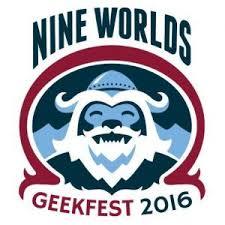 Shortly thereafter I will be at Nine Worlds in London Hammersmith, one of my favourite conventions. My schedule for this includes the following three panels:
Shortly thereafter I will be at Nine Worlds in London Hammersmith, one of my favourite conventions. My schedule for this includes the following three panels:
Saturday 3.15pm Redemption in SF
Saturday 5pm writing Dystopias in a world that’s actually going to crap about our ears (I play fast and loose with the title, but, y’know)
Sunday 3.15 Edit as you go or blast on through.
That gives me a nice range of topics to show my ignorance on. I will also generally be Around and please feel free to say hi, get me to sign anything non-contractual or buy me a drink.
 Almost immediately after that, God help me, I will be boarding a plane for Helsinki to hit up Worldcon 75. My schedule for that is:
Almost immediately after that, God help me, I will be boarding a plane for Helsinki to hit up Worldcon 75. My schedule for that is:
Saturday 11am signing slot
Saturday 15pm panel: portrayal of the scientist
Sunday 11am panel: magical healing (panel with Robin Hobb!)
And after that I will probably drop dead of exhaustion and jetlag.
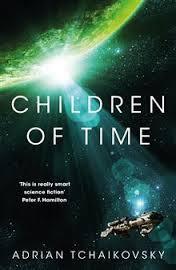 However, before I go spend my poor mortal body on such pursuits, let me tell you the grand news, if you haven’t picked it up from FB or Twitter, the big old movie studio Lionsgate has picked up the option to turn Children of Time into a film. This is something you see happening when you’re connected with enough authors, but it’s most certainly the first time it’s happened to me and it’s enormously exciting. As well as providing potential employment for hundreds of under-utilised arachnid actors.
However, before I go spend my poor mortal body on such pursuits, let me tell you the grand news, if you haven’t picked it up from FB or Twitter, the big old movie studio Lionsgate has picked up the option to turn Children of Time into a film. This is something you see happening when you’re connected with enough authors, but it’s most certainly the first time it’s happened to me and it’s enormously exciting. As well as providing potential employment for hundreds of under-utilised arachnid actors.
Along with the above, I have made the momentous decision to write a sequel to Children of Time. The original novel was pitched as a standalone, but I’ve never written anything entirely cut off from a successor, and if you’ve read it, you’ll see that the final lines certainly prop the door open. Since writing it, I’ve been percolating through ideas to give CoT a worthy follow-up, and those ideas have finally come together in a sufficiently coherent form. I’ll probably be waiting until after August to actually break ground on the project, given how all-over-the-place I am, so I’ll polishing off a few small projects in the interim, but that’s the Next Big Thing.

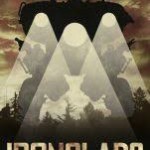 In actual publishing terms, of course, the next big things include Dogs of War from Head of Zeus, a novel about engineered animal soldiers and what happens when they get off the leash (and, because it’s me, you know most of it will be animal POV), and Ironclads from Solaris, a near-future military SF novella about a world where the spoiled brat sons of corporate dynasties get to stomp around in invincible mech suits like the brutal nobility of old, and just what your regular GI thinks about that. Both of these are coming out in November this year (with The Hyena and the Hawk, the final volume of Echoes of the Fall, in February 2018).
In actual publishing terms, of course, the next big things include Dogs of War from Head of Zeus, a novel about engineered animal soldiers and what happens when they get off the leash (and, because it’s me, you know most of it will be animal POV), and Ironclads from Solaris, a near-future military SF novella about a world where the spoiled brat sons of corporate dynasties get to stomp around in invincible mech suits like the brutal nobility of old, and just what your regular GI thinks about that. Both of these are coming out in November this year (with The Hyena and the Hawk, the final volume of Echoes of the Fall, in February 2018).
Finally, I am filled with further delight that The Tiger and the Wolf itself has made the shortlist of the Robert Holdstock award, the British Fantasy Award for best fantasy novel. On the list I’m joined by Jen Williams (the Silver Tide), Joanne Hall (The Summer Goddess) and Steven Poore (The High King’s Vengeance). All the shortlists can be found here at the BFS sight and it looks like a good year.
And breathe…
June 1, 2017
Clarke Award Shortlist 2017 Part 3 : Sufficiently Advanced Mathematics
Occupy Me – Tricia Sullivan
Ninefox Gambit – Yoon Ha Lee
Sufficiently advanced mathematics being, of course, indistinguishable from magic, and that’s the thread I’m using to link these two books – very different in their settings and trappings but united by a core where reality is subject to manipulation in ways that frankly twist the mind.
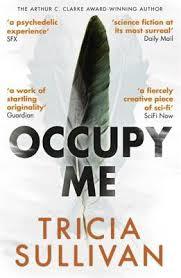 Tricia Sullivan is a SF author of considerable repute, with Occupy Me her fourth visit to the Clarkes shortlist (having, I believe, won it in 1999 with Dreaming in Smoke). This is a book about time, space, energy and angels, and it’s going to be relatively difficult to talk about because finding out what is actually going on is one of the chief pleasures of the book. The plot effectively starts in the middle and then unfolds towards the beginning and the end simultaneously, and that is entirely appropriate for the sort of physics that is flying around in the plot. Flying, in fact, is a major theme. One of the major viewpoints is from an angel, or at least an interdimensional entity that manifests as an angel (I was very much put in mind of Robson’s excellent Living Next Door to the God of Love, another Clarke’s shortlistee). She has been “hijacked” from her native reality/plane/dimension and dumped on earth with only the loosest idea of what she is for, save for helping people and lifting and carrying heavy things, and she is on the trail of the individual/entity who jumped her to earth because he still has her higher-dimensional kit that she needs to get back to… wherever or whatever it was she came from.
Tricia Sullivan is a SF author of considerable repute, with Occupy Me her fourth visit to the Clarkes shortlist (having, I believe, won it in 1999 with Dreaming in Smoke). This is a book about time, space, energy and angels, and it’s going to be relatively difficult to talk about because finding out what is actually going on is one of the chief pleasures of the book. The plot effectively starts in the middle and then unfolds towards the beginning and the end simultaneously, and that is entirely appropriate for the sort of physics that is flying around in the plot. Flying, in fact, is a major theme. One of the major viewpoints is from an angel, or at least an interdimensional entity that manifests as an angel (I was very much put in mind of Robson’s excellent Living Next Door to the God of Love, another Clarke’s shortlistee). She has been “hijacked” from her native reality/plane/dimension and dumped on earth with only the loosest idea of what she is for, save for helping people and lifting and carrying heavy things, and she is on the trail of the individual/entity who jumped her to earth because he still has her higher-dimensional kit that she needs to get back to… wherever or whatever it was she came from.
The second major narrative tells the story of her apparent nemesis, or rather the human doctor whom that nemesis sporadically possesses to do things like, inter alia, steal angels. His life is entangled with that of a phenomenally rich oil baron and crook whose money seems key to whatever the possessing force wants to accomplish, and all of this is complicated by the fact that the possessor appears to be an alternate world version of the possessee. And there are dinosaurs and whole lot of other strangeness which, as noted, the readers really needs to discover for themselves – suffice to say, when you do find out what’s going on, it’s ingenious and (imho) very satisfying. The two main viewpoints are nicely bound together by using first person for the angel, second person for the other (so in effect the angel speaking to doctor telling him what he’s doing, I think).
Occupy Me is definitely high concept, perhaps the most of the whole list (and being higher concept than Ninefox Gambit takes some doing). The two central characters, though opposed to each other, are entirely sympathetic, and the angelic messenger is an intriguing look at something human-like but inhuman, cognitively limited by her construction and remnants of her inbuilt purpose and trying to make her way in the world despite the gaping holes in her memory. There are some scenes, where everything is coming from her skewed perspective, where the reader is left to imagine all manner of horrors that she might simply be overlooking. All in all, it’s a complex but rewarding read.
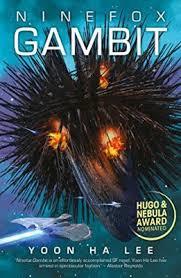 I first heard of Ninefox Gambit via Ed Fortune on the Brave New Worlds podcast, who gave it a particularly rave review. Subsequently, like the Chambers, it found its way to the Hugos shortlist and has attracted a great deal of critical attention. Ninefox is Lee’s first novel, the start of the Hexarchate series.
I first heard of Ninefox Gambit via Ed Fortune on the Brave New Worlds podcast, who gave it a particularly rave review. Subsequently, like the Chambers, it found its way to the Hugos shortlist and has attracted a great deal of critical attention. Ninefox is Lee’s first novel, the start of the Hexarchate series.
As I’ve been making comparisons, should I call Ninefox something like Ancillary Justice meets Quantum Thief by way of Warhammer 40,000? Probably not, because it has more going on than that might suggest, but I was put in mind of all three while reading. Lee gives us a far future space opera complete with a vast and complex empire (the titular Hexarchate, formerly the Heptarchate) that has a particularly original reason for wanting to impose its cultural norms on all and sundry. The Hexarchate relies on complex advanced mathematics to make its technology work, and specifically it requires everyone to be (literally) singing from the same hymn sheet – the same calendar, the same rituals, everyone acting in prescribed ways in order to bend the universe of numbers into a shape that permits their tech to flourish. When heretics arise and start using their own calendar, everything in that part of space gets thrown out of whack, and all the fancy toys don’t work properly. And the Hexarchate sends in the troops to stomp everything back into its proper alignment.
Cheris is one of those troops, part of the Kel, the warrior caste whose inspiring totem is the “suicide hawk”, which gives you a good idea of just how they tend to get used (very 40K, that bit). Being a Kel with an unusual gift for maths she ends up in charge of an assault on a heretic fortress guarded by impregnable “invariant” shields (i.e. shields that are not reliant on a given calendrical system). Or, rather, not quite in charge, because she is more properly the host of the arch-traitor undead general Shuos Jedao, whose resurrected tactical genius is just what the Hexarchate needs to crack the fortress. But Jedao is famously murderously insane, and now he’s inside Cheris’s head.
This all sounds particularly grim so the big surprise here is just how much sheer fun this book is. It clips along at a fast pace and delivers everything you could want out of a military naval SF adventure whilst also presenting one of the most original SF settings I’ve come across (I’m going to throw Dune into the mix as well, but only if the Empire in Dune was run entirely by Mentats and Navigators). The universe is presented in sufficient detail to promise that there’s a great deal more to learn than the first book shows, and, like Chambers, doesn’t feel that just because its characters are rushing around in spaceships, they can’t also have hobbies or watch bad duelling romances. There is a lot of chemistry between Cheris and Jedao, because he’s terribly urbane and witty and at the same time the fact of his true nature is right there like Cheris’s shadow, all the time, and Cheris is simultaneously on guard against him and learning from him. I also particularly liked the Servitors, the ubiquitous animal-form robots that keep everything running, with which Cheris has a somewhat illicit friendship (they reminded me very strongly of Crow and Tom Servo from MST3K). There is also – as with many space empire stories focusing on a single individual – the question of just how much we should be rooting for the Hexarchate, whose universe-bending calendar includes the ceremonial torturing of heretics as a necessary element…(1) Ninefox Gambit has gone right onto my list of books where I’m going to grab the sequel as soon as I have the chance.
So: wrapping up, six eminently worthy nominees, and we’ll have to wait until July for the winner. It’s a profoundly tough choice, to be honest (and I’m leery of making any personal bets because my record on such things is terrible). They are all, though, terribly good and, despite my hamfisted lumping them in pairs, all very different, covering a broad slice of what makes SF such a fun genre.
(1) Which gives us a view into the mind of the Hexarchate, really: a system which cannot tolerate heresy without falling apart, and yet which requires a constant supply of heretics…
May 24, 2017
Clarke Award Shortlist 2017 Part 2 : The Evil That Men Do
Underground Railroad – Colson Whitehead
After Atlas – Emma Newman (1)
So what about books that have a rather less optimistic take on the world? As it turns out, the shortlist has those too, and these are definitely the bleakest.
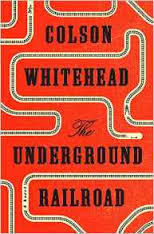 I hadn’t come across Whitehead until the shortlist was announced, but a little research shows that’s entirely a deficit on my side, as he comes very highly recommended (1) over in the US, and Railroad shows why. This is a semi-historical, set in the pre-Civil War US and focusing on Cora, a third generation slave on a plantation who decides to make a break for the north. This is not a decision taken lightly. A fair chunk of the early book details the lives of Cora, her mother and her grandmother, and pulls absolutely zero punches when it comes to dealing with the obscene cruelty of slavery and the plantations, with details that, I have no doubt, are entirely based on real history. Whitehead has an elegant, easy style that carries the reader along effortlessly, which makes those moments when he slams you face-first into the next abomination all the more powerful. It is also a book about shades of horror, because Cora’s life starts off as grimmer than most grimdark fantasy could even imagine, and that’s a high point because her original owner is, at least, merely baseline disinterestedly cruel, rather than actively sadistic like the next man.
I hadn’t come across Whitehead until the shortlist was announced, but a little research shows that’s entirely a deficit on my side, as he comes very highly recommended (1) over in the US, and Railroad shows why. This is a semi-historical, set in the pre-Civil War US and focusing on Cora, a third generation slave on a plantation who decides to make a break for the north. This is not a decision taken lightly. A fair chunk of the early book details the lives of Cora, her mother and her grandmother, and pulls absolutely zero punches when it comes to dealing with the obscene cruelty of slavery and the plantations, with details that, I have no doubt, are entirely based on real history. Whitehead has an elegant, easy style that carries the reader along effortlessly, which makes those moments when he slams you face-first into the next abomination all the more powerful. It is also a book about shades of horror, because Cora’s life starts off as grimmer than most grimdark fantasy could even imagine, and that’s a high point because her original owner is, at least, merely baseline disinterestedly cruel, rather than actively sadistic like the next man.
Her story is interspersed with that of Ridgeway, a slave catcher, who is written as a kind of mirror-universe version of the traditional American/Western hero – he is a physically capable man who goes out and wrests a living from the world on his own terms, scornful of rules and civilized niceties – all very creditable except of course for what his living actually is. (And it is a nice touch that the Ridgeway we get in the sections where he is our POV is subtly more capable than the Ridgeway we see through Cora’s eyes when they clash).
Where this book crosses from the historical into Clarkes territory is the railroad of the title. Now I have a confession here, because my knowledge of this period is limited and my first introduction to the phrase ‘underground railroad’ was in Babylon 5, which utterly baffled me because I thought they were talking about a literal one. And in Whitehead’s book, there is. Instead of the loose network of sympathisers and rescuers, white and black, there is a genuine railroad under the ground smuggling slaves from place to place, constantly in danger of being discovered by the slavers. In this way, Whitehead gives us the southern US as a series of “stations” (2) where different scenarios play out between black and white, slave and free.
There is a large supporting cast on both sides of the divide, and Whitehead doesn’t just give us a polemic where all whites are evil, all slaves are virtuous – Cora’s early life in the plantation includes plenty of violence and ostracism from her fellows. The characters are all finely drawn, and there is a series of brief sketches giving us a window on some of the smaller roles. The book itself is a succession of tragedy and injustice, the whole world stacked against slaves on the run and whoever might lift a hand to help them, yet compelling all the while.
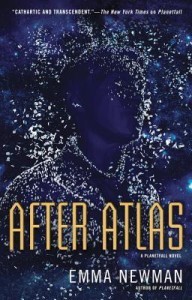 I’ve praised Newman’s work on many occasions, and in particular I enjoyed Planetfall, to which After Atlas is a semi-sequel (like the Chambers, you can read Atlas alone but having read the first book will give you extra context).
I’ve praised Newman’s work on many occasions, and in particular I enjoyed Planetfall, to which After Atlas is a semi-sequel (like the Chambers, you can read Atlas alone but having read the first book will give you extra context).
Planetfall concerns itself with an extrasolar colony on a barren planet alongside an incomprehensible alien structure, guided there by a religious visionary. The colonists are, in effect, that part of her cult who got together the colossal resources required for humanity’s first jaunt to another star system in the spaceship ‘Atlas’. (because, like a lot of cults, they had many rich and influential members). After Atlas, as the title suggests, is about what they left behind, both the world as a whole and the remainder of the cult who didn’t get to go.
Carlos Moreno grew up in the cult, but subsequently broke from it and has a deeply ambivalent but mostly hostile attitude towards it. He got out by going into an intensive training/brainwashing program to turn him into a human super-investigator, which has further screwed him up as well as leaving him the property of the people who paid for his reprogramming (and I hadn’t considered the slavery link with Underground Railroad when I paired these books, but it’s there). His corporate owners hire him out to the police as a detective, and in his free time he scrounges for decent food he can’t afford (having an aversion to the printed food most everyone poor subsists on) and dodges the press who want to talk to him about his life in the cult (and his father, who remains a cultist). And then the head of the cult, who was a huge part of Carlos’ life back then, is found mysteriously dead in a UK countryside hotel and Carlos is the only investigator the vastly wealthy cult will trust.
It’s not uncommon to find SF or fantasy books that are also framed as crime/detective stories. There is, however, always a danger that, in trying to square that genre circle, the author delivers an uninteresting mystery in an uninteresting world. However, when done well, it’s a particular joy (as in Roberts’ Jack Glass say, or Christopher’s Made to Kill) and Newman does it particularly well. One of the big bugbears of a modern investigative novel, let alone a futuristic one, is the intrusion of technology – how can you have someone pottering about like Holmes or Poirot when all that hi-tech analysis is at their fingertips. In Atlas, that is the very point and heart of the investigation, as Carlos’ special flair is for data gathering and analysis, and he uses absolutely every avenue you’d expect to get to the truth (perhaps the lesson here is that a SF detective story needs to make the technology its vehicle, rather than an obstacle the writer must get around). Moreover, when we discover What Is Actually Going On, it’s both credible and poignant. And then, of course, we discover What Is Actually Actually Going On.
Just as Whitehead gives us an unvarnished view of a vile period of human history, Atlas gives us an unabashed dystopia – not the shooting arrows and rebellion against established order sort of dystopia, but a world that is decaying and running out of everything, where the imbalance between the vastly wealthy in their countryside retreats and the subsistence poor is a chasm grown so vast as to be insuperable. When we get to see the super-rich in all their vindictive glory, it made me genuinely furious. I raged for the main character and his helplessness in the face of such small-minded power (and that sketch of how plutocrat treats lesser beings who get in his way seems, these days, terribly well drawn). And what makes this world worse is the titular Atlas, because, rather than being the hopeful “reach for the stars”, launching the first ship was a vast drain on global resources and talent, crippling the world economy, and of course everyone’s wondering if the cult – or someone else – will be launching another some time soon. Atlas is gritty, compelling and bleak as hell, and immeasurably plausible in its side-eye at human nature. The contrast to Tidhar and Chambers’ books is very marked. Here, launching a spaceship is not the jump to a new and bustling future but an act born equally of desperation and exploitation.
(1) Emma being a good friend I hereby solemnly swear that the book is bloody excellent without any favouritism coming into play. This becomes something of an occupational hazard after a while in the trade because you get to meet a fair proportion of your fellow authors.
(2) Including by a former president!
(3) In the same sense used by Coppola when talking about the journey in Apocalypse Now, and before that in the “of the Cross” sort of sense I think.
May 20, 2017
Clarke Award Shortlist 2017 Part 1 : Faith in the Future
This year I’m breaking the review up into three parts, because the shortlist, in my idiosyncratic perspective, seems to form some loose pairs, so first I give you:
A Closed and Common Orbit – Becky Chambers
Central Station – Lavie Tidhar
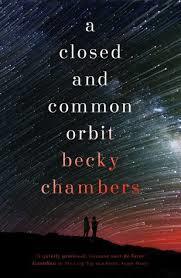 Because I didn’t get the chance to do a Clarkeslist post last year, for what I hope are excusable reasons, I was denied the opportunity to laud Chambers’ first outing, A Long Way to a Small and Angry Planet. This book was one of the ones I would have been happiest to lose to. It was also the subject of a mixed bag of reviews, which may be because it’s SF about, not the space beyond our atmosphere but the space between people (which ‘people’ very emphatically includes nonhuman sentience). In a weird kind of way, Planet was a Sci-fi soap opera, in the same way that Jay and Miles Explain the X-Men describe their focus as a superhero soap opera, which only goes to confirm that my aversion to soap operas as commonly seen on the TV is because the people depicted live such dull and humdrum lives. Add spaceships and an AI or two and I’d be hooked (1). Planet, then, is about the journeys of the characters, separately and together, as much as the titular journey itself. It presents a universe that is by no means idealised, but is remarkably upbeat and hopeful compared to the majority of SF – that rare thing, a believable future you’d want to live in. Highly recommended, anyway.
Because I didn’t get the chance to do a Clarkeslist post last year, for what I hope are excusable reasons, I was denied the opportunity to laud Chambers’ first outing, A Long Way to a Small and Angry Planet. This book was one of the ones I would have been happiest to lose to. It was also the subject of a mixed bag of reviews, which may be because it’s SF about, not the space beyond our atmosphere but the space between people (which ‘people’ very emphatically includes nonhuman sentience). In a weird kind of way, Planet was a Sci-fi soap opera, in the same way that Jay and Miles Explain the X-Men describe their focus as a superhero soap opera, which only goes to confirm that my aversion to soap operas as commonly seen on the TV is because the people depicted live such dull and humdrum lives. Add spaceships and an AI or two and I’d be hooked (1). Planet, then, is about the journeys of the characters, separately and together, as much as the titular journey itself. It presents a universe that is by no means idealised, but is remarkably upbeat and hopeful compared to the majority of SF – that rare thing, a believable future you’d want to live in. Highly recommended, anyway.
A Closed and Common Orbit (which is also on the Hugo shortlist right now) is a semi-sequel, readable in isolation but better after having taken in the first. Rather than scatter the plot over a large number of characters like Planet, Orbit follows two plotlines separated in time, both of which revolve around the relationship between living people and AIs. In this universe, AIs are entirely sentient but are property, and to incarnate one in a human-seeming body is possible but very very illegal – a standout dystopian note in an otherwise enlightened galactic community. Lovelace is such an incarnated AI trying to adjust to her new limits and abilities under the tutelage of Pepper, whose backstory we also slowly uncover, with its own peculiar relationship to AIs. I enjoyed Planet immensely, but I think Orbit is the superior, both for its tighter focus and for its exquisite exploration of the shift from being a ship-wide AI to suddenly being limited to a human body – although the previous book sold the transition as a good thing, Lovelace finds the situation profoundly discomforting at every turn. It is also a very emotive book, the denouement bringing a definite tear to the eye. I want to wave a flag for Chambers’ aliens – while there is a definite Trek-like philanthropic principle going on, the species are all well defined, and then the individuals are separately defined so that you don’t get the common problem of “all of X species are like this”, and furthermore “X species are basically humans with this hang up and a narrowed emotional range”. Like Planet, Orbit makes a virtue of telling the stories of ordinary people in a multispecies galactic community, with plenty of digressions and diversions that only add to the verisimilitude of the world and the characters.
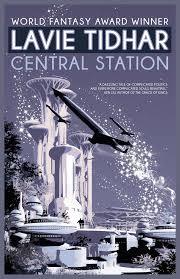
Lavie Tidhar is already a decorated author with a World Fantasy Award under his belt, among others. I first came across him with his steampunk fantasy Bookman series, which has a pleasant quota of insect-like things and a glorious collusion between Dr Moreau and Dr Pavlov. More recently he has become known for writing weirder stuff – Osama, A Man Lies Dreaming and the Superhero/espionage This Violent Century which was my personal favourite. Central Station is a fascinating glimpse of a sort of “future that never was” in the same way Gibson’s Neuromancer and sequels is. The book is set primarily in Tel Aviv, gateway to the stars and major jumping off point for a solar-system wide community. Like Chambers’ work, the book is driven by the characters and their inter-relations rather than rushing along a plot, so that Tidhar presents us with a slice of life of the lowly, broken and strange who live in the shadow of Central Station. The feel is part pulp SF serial, part cyberpunk, part Perdido Street Station (2). Tidhar (also like Mieville) is extremely good at conjuring a huge and detailed world beyond the book with just a few chance mentions and throw-away references, so that the future Israel (seen primarily through the eyes of the descendants of Nigerian and Chinese immigrants) and its wider environs are brought alive for the reader at every turn. And there are godlike AIs (the story of whose genesis is a major thread) and abandoned war cyborgs and a glorious homage to CL Moore.
Even more than the two Chambers books, Station isn’t a book about space war or the end of the world, save as that latter applies to individuals. It is a tapestry of individual characters, every one artfully and lovingly drawn down to the very least, whose lives touch and interact with each other, but who exist in their own right rather than to serve the thrust of a greater plot. At the end, some may find a measure of peace, some may find a modicum of the knowledge they seek, something new might be born, something else may finally find an end. But that’s not necessarily what the book’s about. It’s about the people (including robots, cyborgs, sentient infowar weapons, and also just people) whose lives we pass briefly through, just as they pass briefly through each others’
I had read A Closed and Common Orbit before the shortlist, and coming to Central Station after I was struck by how complimentary the two books are, and how similar their concerns. As well as the very street-level focus and the willingness to simply let their characters live, both books depict a future that is, despite all the trials and tribulations of the people involved, fundamentally optimistic (3), which is something of a rarity these days. Neither is about the super-powerful or the super-rich swanning about bleeding luxury, and neither is about a post-scarcity Banksian world where everyone can have everything (though the Chambers is closer), However, even taking into account the failing Robotnik cyborgs and the existential crisis of the robot clergyman R.Brother Patch-It, or Lovelace’s illegal status and the exploitative past of Pepper, both books envisage a future where we have at least Got There. We’re out in space, making and/or meeting wonderful things. Right now, looking at the world, we should be so lucky as to have a future like that.
(1) And arguably genre TV since Buffy has been all about using soap operatic elements in a supernatural or SF setting, and has benefited immensely from it.
(2)And it’s not just the name. Mieville and Tidhar are both intimately concerned with the littoral, the places where one thing meets and transforms into another, whether that boundary is within a city or within an individual.
(3) YMMV, I thought so, anyway.
May 9, 2017
The Sound of Spiders (and free audiobook competition!)

I am delighted to announce that the audiobook of Children of Time is right now available from Audible. You can find it here read by the very able Mel Hudson. I am also informed that Audiobooks of The Tiger and the Wolf and Guns of the Dawn are planned direct from Pan Macmillan who are now recording their own.
This is the first time I’ve formally and legally had audiobooks available and, as it’s something I’m regularly asked about, it’s a proper joy to actually be able to say “yes” to that question.
I also have some free copies of the audio Children of Time courtesy of Audible, which love I feel I should spread, so: comment below if you’d like one, and I’ll randomly determine some winners at the end of the week.



